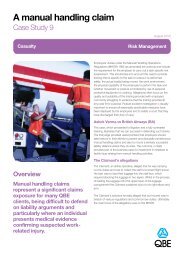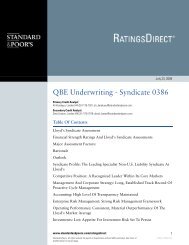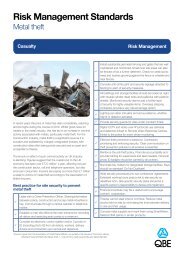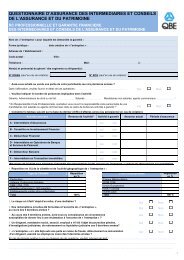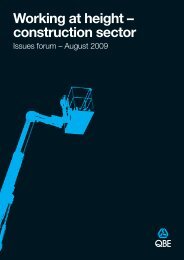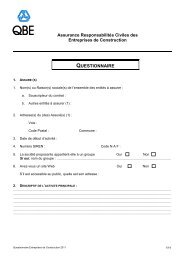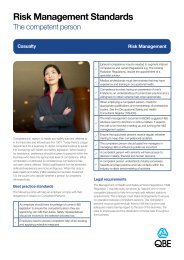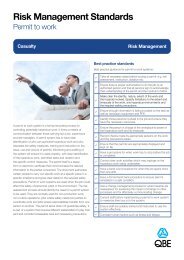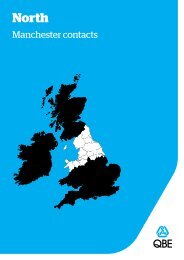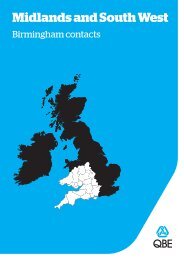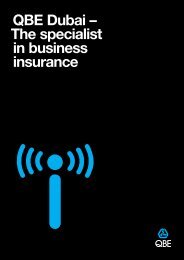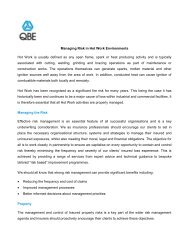QBE Syndicate 2999 Annual Report and Accounts 2009
QBE Syndicate 2999 Annual Report and Accounts 2009
QBE Syndicate 2999 Annual Report and Accounts 2009
You also want an ePaper? Increase the reach of your titles
YUMPU automatically turns print PDFs into web optimized ePapers that Google loves.
1 Accounting policies continued<br />
g) Administrative expenses<br />
Administrative expenses are taken into account on an accruals basis. These recharged expenses include the costs of staff, who are employed by <strong>QBE</strong><br />
Management Services (UK) Limited. <strong>QBE</strong> Management Services (UK) Limited operates both defined benefit <strong>and</strong> defined contribution pension schemes,<br />
the expense of which is included in the recharges.<br />
h) Profit commission<br />
Profit commission is recognised on the basis of the annual accounting result for each year of account, <strong>and</strong> charged to the syndicate as incurred.<br />
From the 2008 year of account, no profit commission has been charged by the managing agent. For prior years of account profit commission was<br />
charged by the managing agent at a rate of 20% of profit subject to the operation of a deficit clause.<br />
2 Capital<br />
Each syndicate in Lloyd’s is required to carry out a self assessment of the capital it requires, the Individual Capital Assessment (ICA). This is required<br />
to reflect the level of capital needed to ensure that the syndicate will remain solvent for the next 12 months in 99.5% of future foreseeable scenarios.<br />
<strong>QBE</strong> has developed a sophisticated stochastic risk-based capital model over the past three years, which incorporates the key risks being faced by each<br />
of the legal entities. The output from this model, which is tailored to <strong>QBE</strong>’s risk profile, is reported to the Capital Committee, which in turn recommends<br />
it to the relevant <strong>QBE</strong> Boards for adoption. The ICAs have been reviewed by Lloyd’s, <strong>and</strong> form the basis of the minimum capital required by the syndicate.<br />
Every member is required to hold capital at Lloyd’s which is held in trust <strong>and</strong> known as Funds at Lloyd’s (FAL). These funds are intended primarily to cover<br />
circumstances where syndicate assets prove insufficient to meet participating members’ underwriting liabilities.<br />
The level of FAL that Lloyd’s requires a member to maintain is determined by Lloyd’s based on FSA requirements <strong>and</strong> resource criteria. FAL has regard<br />
to a number of factors including the nature <strong>and</strong> amount of risk to be underwritten by the member <strong>and</strong> the assessment of the reserving risk in respect<br />
of business that has been underwritten. Since FAL is not under the management of the managing agent, no amount has been shown in these financial<br />
statements by way of such capital resources. However, the managing agent is able to make a call on the member’s FAL to meet liquidity requirements<br />
or to settle losses.<br />
All externally imposed capital requirements have been complied with during the year.<br />
<strong>QBE</strong>’s capital model has been embedded in the business, <strong>and</strong> as well as assessing minimum capital requirements for <strong>QBE</strong> entities, it has also been<br />
used to:<br />
• allocate capital to class of business for business planning <strong>and</strong> performance monitoring;<br />
• assess the effectiveness of existing reinsurance protections <strong>and</strong> new reinsurance strategies; <strong>and</strong><br />
• consider the implications of Solvency II on the business.<br />
31<br />
<strong>QBE</strong> <strong>Syndicate</strong> <strong>2999</strong><br />
<strong>Annual</strong> report <strong>2009</strong>



